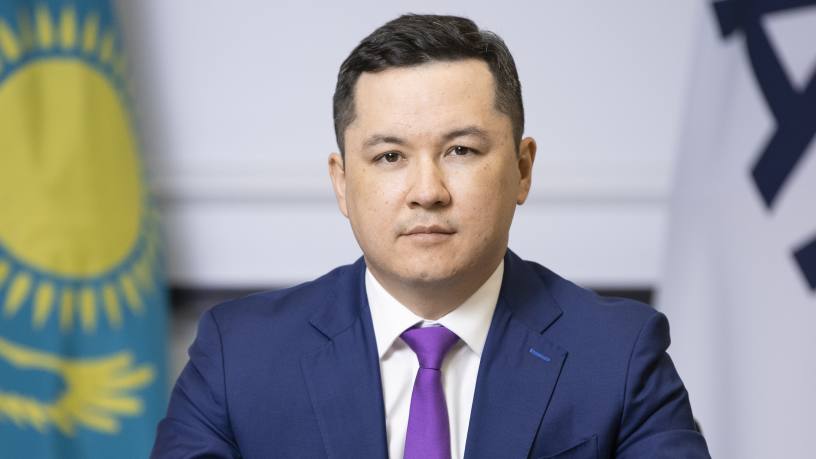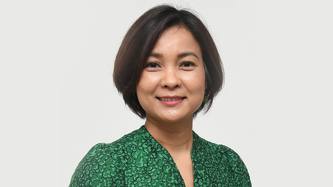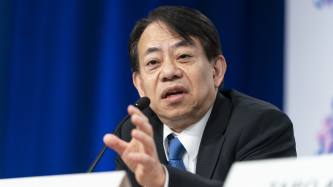Q: The Astana International Financial Centre (AIFC) has attracted more than $10bn of investment since its launch in 2018. Where has this investment come from, and how was it attracted?
A: The investment is broken down into public and private investments. Public investments are those raised by the Astana International Exchange (AIX) platform, and are divided between debt capital and equity. Equity is at about $356m, starting from the initial public offering (IPO) of Kazatomprom in November 2018, and is a combination of local and foreign investment. Other equity offerings include the listing of local fintech giant Kaspi.kz and the IPO of KazMunayGas, the largest state-owned oil company in Kazakhstan.
Of the total, $3.4bn is debt securities listed by sovereigns and corporates on AIX. These include Ministry of Finance-issued bonds in euros and other currencies. Banks have also been active. We are proud we have been able to open the capital markets for some industries which have been unable to lend from the banks – for example, construction, which had trouble raising capital after the industry collapsed following the global financial crisis. In recent years they have been able to raise funds in the local currency. While only short term and in low amounts, it helps them finance business such as the housing market. Also, we have developed new instruments for green bonds.
The remaining $6.3bn is investments by the participants in AIFC. A big chunk is from the Chinese institutions, namely China Development Bank and China Construction Bank, the latter of which has a branch in AIFC. They have a lending portfolio in mining, and oil and gas. We see the fund industry is growing, such as the uranium fund from Kazatomprom and Genchi Global Asset Management. Also, Chevron has registered its $250m Chevron Direct Investment Fund, which they plan to invest in non-extracting industries.
There are also small venture capital funds developing due to the independence and rule of law that applies in AIFC. Additionally, there are crowdfunding capabilities in AIFC that do not exist in Kazakhstan. They were able to raise funds for small and micro entrepreneurs up to Tg10.6bn ($23.3m).
Q: How is AIFC supporting Kazakhstan’s overall economy?
A: We are five years old, and three years of that was under Covid. As business was quiet during the pandemic, we used the time to develop our platform and infrastructure. Over the past year, with changing geopolitics, we see that AIFC’s role is growing in the region.
We created a deleveraging platform with the goal to make sure capital flows are efficient and there are fewer transaction frictions and costs.
Participants of AIFC have paid Tg55bn in tax. Almost 50% of this was paid during 2022 alone. I think this number will only grow, representing a direct fiscal contribution to the government. More importantly, this is the platform where we can be sure investments will flow in. We have seen the development of the Middle Corridor, and have seen that KazMunayGas and Abu Dhabi Ports have created a joint venture to operate tankers, enabling us to diversify our oil routes to Europe.
Q: Has Kazakhstan seen an uptick in business from companies leaving Russia?
A: Kazakhstan has close ties with the whole Eurasian Economic Union and especially Russia, due to our long border with Russia. We have seen some companies relocating. Given the sanctions risk, we have set up proper procedures to filter the companies, and within the regulator created a strategic committee to catch companies that were potentially relocating to circumvent sanctions. We only want companies with economic engagement in Kazakhstan or the region to move into AIFC.
We have seen some big, international companies moving their offices from Russia, and they are more than welcome. For example, the regional offices of TikTok and KPMG have both now registered with AIFC. Polymetal International has also moved, and taken their main trading out from the London Stock Exchange to AIX. More international investors looking to fill the gap in their portfolio after Russia became a non-investment jurisdiction will look to AIFC for those opportunities.
We have seen analysts from the big investment houses and portfolio managers calling us and travelling to Kazakhstan to seek out these opportunities. While it hasn’t been a huge uptick in business, it has given us the opportunity to domicile headquarters and regional divisions.
Q: How is Kazakhstan’s economy maturing? Is the capital market space growing?
A: The economy is doing comparatively well. For 2023, the International Monetary Fund (IMF) projects that gross domestic product will accelerate to 4.8%. The IMF expects inflation to moderate from 20% at the end of last year to around 12%. The government has reported record levels of foreign direct investment (FDI) last year, at around $28bn.
In terms of the capital market we are at an early stage, but we are pushing it forward with AIX and by creating a jurisdiction that is similar to what fund managers would see elsewhere. We have introduced different flexible structures, allowing the creation of general partnerships, limited partnerships, and limited liability partnerships, for example. Companies in AIFC can have different classes of shares, tailored to different groups of investors.
It has created a small but growing space for private investors. For example, one of the start-ups that operates in Tajikistan has registered in AIFC due to the rule of law. We see foreign investors requiring companies from the region to register here. Singapore’s venture capital firm Quest Ventures requires project start-ups to register with AIFC.
The retail base is growing. We saw 70,000 individual investors participate in the IPO of KazMunaiGas last year, compared to 2700 during the IPO of KazAtomProm in 2018. The number of investor accounts in the AIX central depository is now at almost one million, up from 90,000 at launch in 2018. The space is growing and we need to concentrate on reforming the industry for both issuers and investors, but the industry has tremendous opportunity to develop.
Q: What are the future goals for AIFC? Are there business sectors or countries that are underrepresented which could be targeted?
A: In our revised strategy we want to focus on the facilitation of FDI, especially in transportation and logistics, agriculture and mining. We are also looking at the geographic diversification of investors. Traditionally, Europe and the US are the largest investors. While they are still important and committed, now we are looking at new strands of capital from the Middle East and Asia, particularly China.
We will continue to develop our infrastructure in terms of connectivity to international financial institutions and working with issuers to raise capital.
We also want to focus on innovation to enable start-ups to raise capital and explore their ideas within our regulator’s fintech sandbox. With the emergence of AI and blockchain, this is an area to focus on as a higher value-add industry to move the country’s economy forward.
Finally, environmental, social and governance is of course important. We are working with the government to approve the taxonomy of social projects. The next step is to help the country in its aspirations to become carbon neutral by 2060 by creating a carbon units trading system and much more. This is especially important in light of the EU introducing CBAM, the cross-border adjustment mechanism. We believe if we don’t invest in this, we will have to bear the cost in the future.













